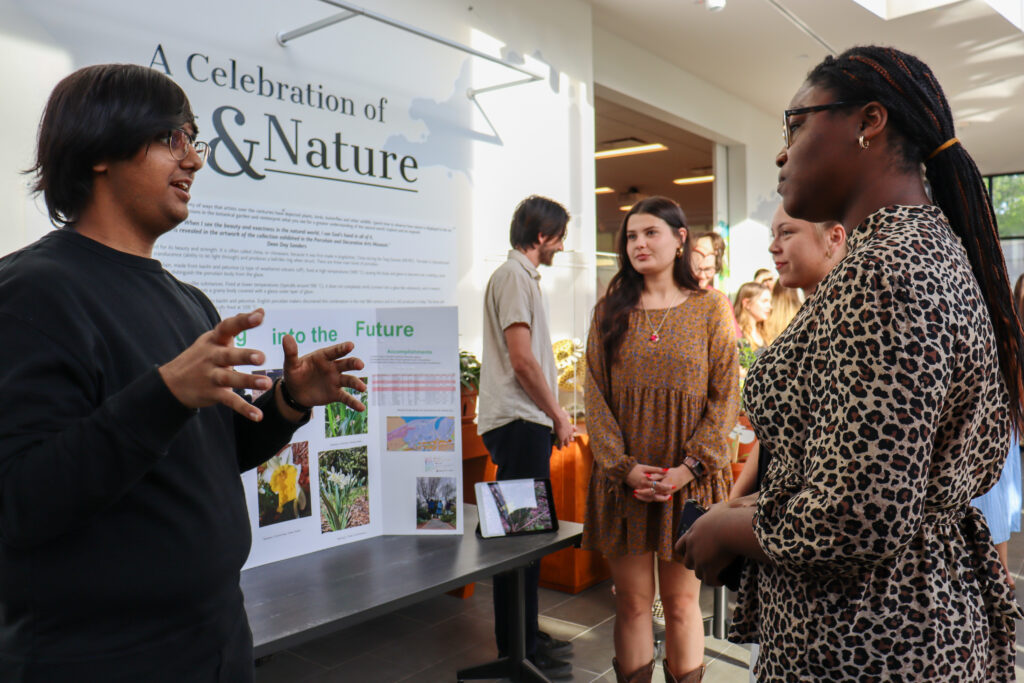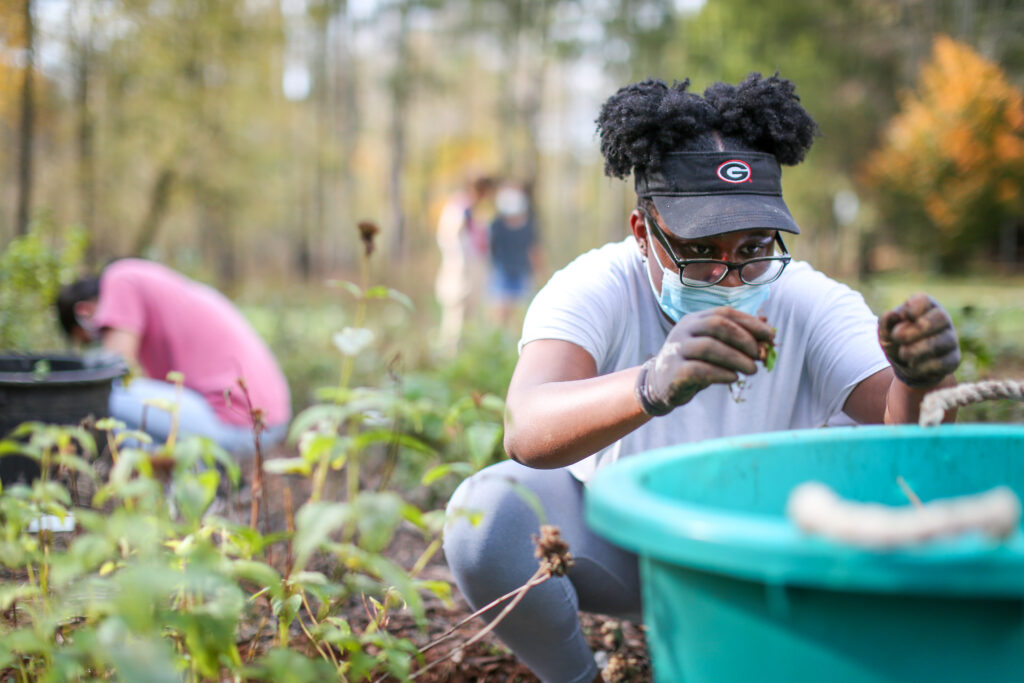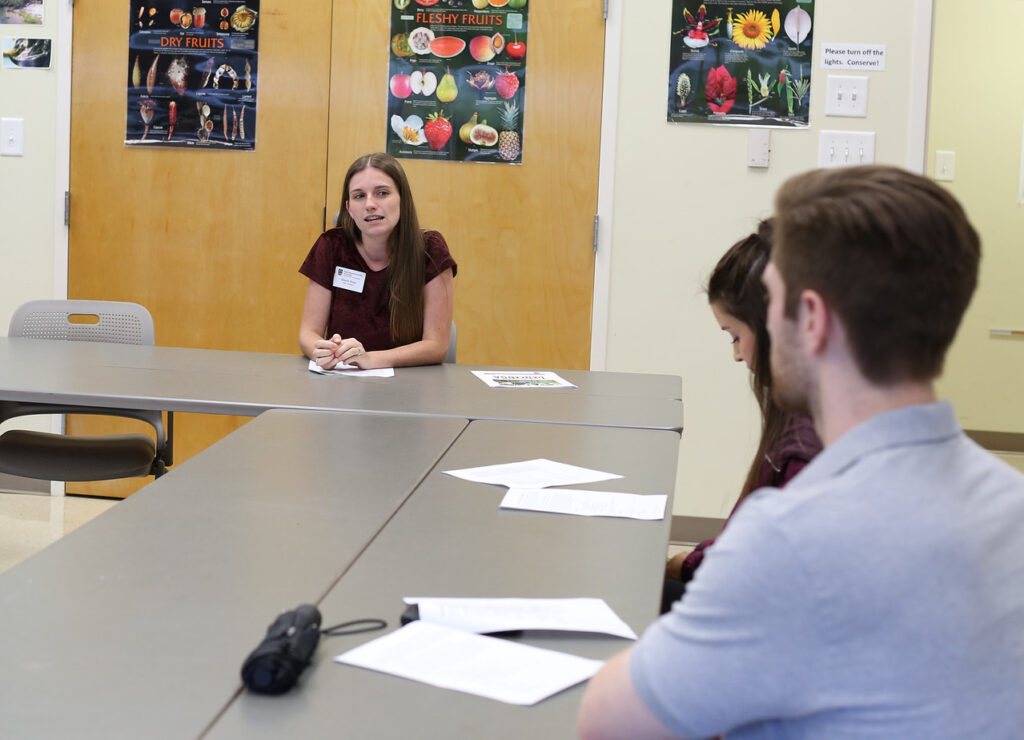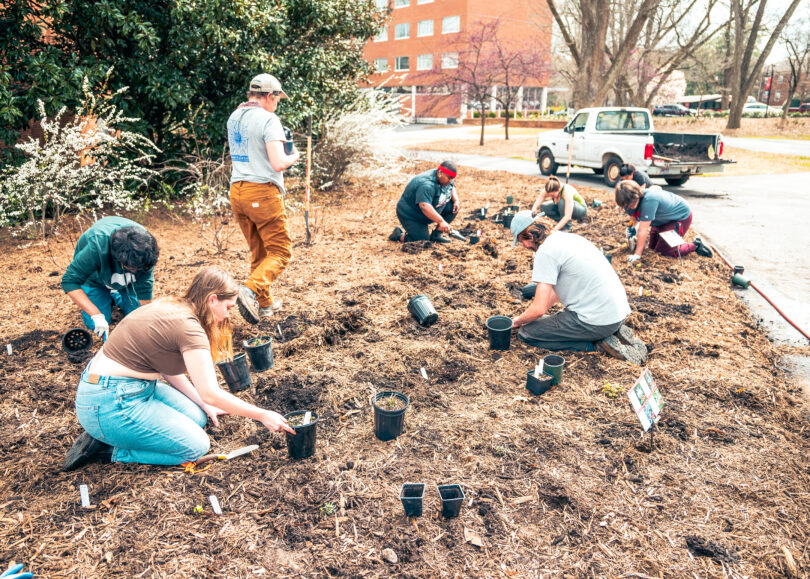Since the State Botanical Garden of Georgia at the University of Georgia piloted the Learning by Leading program in 2018, 171 UGA students have gained skills preparing them to enter the workforce after college.
Learning by Leading at the University of Georgia is a hands-on program developed for the botanical garden to increase leadership skills through a comprehensive experiential learning program. Students progress through a leadership ladder, gaining technical, human and conceptual skills while working alongside staff mentors at the State Botanical Garden.

Learning by Leading students who have worked on mapping plant collections in the State Botanical Garden present to their peers at the end-of-year showcase. (Photo by Laurel Clarke)
“A goal of the University of Georgia is to help prepare the next generation’s workforce,” said Cora Keber, director of education at the State Botanical Garden. “Learning by Leading helps fulfill that university mission in a meaningful experiential capacity. We’re aligning ourselves with the outcomes of the university and supporting the green industry by preparing students to enter that workforce.”
Learning by Leading is an approved program for Service, Leadership and Intern experiential learning credits, a university requirement for all undergraduate students.

Students weed beds, plant natives in the prairie restoration area and collect seeds. (Photo by Shannah Montgomery)
Students work on teams, ranging from horticulture, environmental education, conservation, visitor services and more. A staff mentor guides them, and as students progress through the program they can become student leaders in their teams.
The idea for the program began when the garden’s director, Jenny Cruse-Sanders, attended the American Public Garden Association’s annual conference in 2017 and learned of the program created by the UC Davis Public Garden and Arboretum.

Students tour the SBG and learn about the projects they will be working on through the Learning by Leading Program. James Anderson is the PSO Faculty Fellow who is working with the students in his class. They will work real-world projects at the garden. This semester projects include creating an updated naming /mapping system for identifying plants through the horticulture department, and creating programming to be used by volunteers who are working in the new Children’s Garden. (Photo by Shannah Montgomery)
Since its inception at the garden in 2018, students have worked on projects including mapping the garden collections, heirloom apple production, plant propagation, creating education programming and curriculum and environmental interpretation materials. It is estimated that students in the Learning by Leading program have contributed over 20,600 hours of work to improving the State Botanical Garden for its estimated 360,000 annual visitors.
The first Learning by Leading student at the State Botanical Garden was Emory Perry.
Perry was a student worker at the garden when Keber approached her and asked if she would be interested in being the student who was part of the pilot Learning by Leading program.
“It was fun, and I loved it,” Perry said. “It was exciting to be a part of something new, and I didn’t realize how big of a program it would be.”
During Perry’s time in Learning by Leading, she helped develop the Garden Earth Explorers, now called Sweet Pea Club, a weekly program for children ages 3-5 to learn about nature. She also helped develop the garden’s newest family festival, Georgia Questival, which showcases Georgia’s natural history and resources through a series of adventurous activities.
Perry said her work with Learning by Leading encouraged her to add the education degree to her studies and gave her a clearer path for what she wanted to do after graduation. She graduated from UGA in 2020 with degrees in physics and science education and went on to teach high school physics and environmental science for two years. Recently, Perry joined the State Botanical Garden staff full time as the adult program coordinator, bringing her Learning by Leading journey full circle.
“Experiential learning is so important because it’s the stuff you don’t learn in class,” Perry said. “Learning by Leading got me involved in the community and helped me make connections. I’m thrilled to be working at the garden again, and I wouldn’t be here if it weren’t for Learning by Leading.”
Since its inception, Learning by Leading has continued to grow and evolve to serve the needs of students, student leaders, interns and staff mentors. Initial funding support came from UGA’s Office of Experiential Learning through an Innovation Grant. Later, support has come from the Friends of the Garden at the State Botanical Garden of Georgia and the UGA Parents Leadership Council.
James Anderson of the Department of Agricultural Leadership, Education and Communication served as a UGA Public Service and Outreach Faculty Fellow and led a six-series leadership training for staff mentors during the 2018-2019 academic year.
Professional development programs such as science communication, branding and marketing, environmental interpretation and True Colors training have been offered to students and staff mentors throughout the past five years.
“As a PSO Fellow, I had the opportunity to work with the garden to develop a mentor training program,” Anderson said. “This was a unique project because many mentoring programs rarely focus on the development of the mentor; the focus is usually on the development of the protégé. This unique quality is just one of many that make this program special. It is designed to transform everyone involved.”
For more information about the State Botanical Garden of Georgia and Learning by Leading, visit botgarden.uga.edu.








